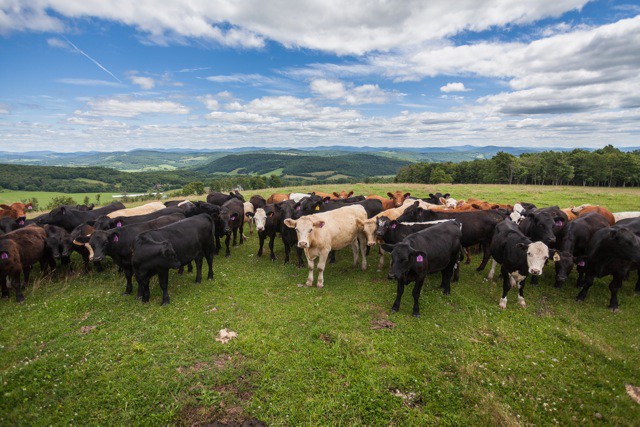Sarah Teale has
produced a number of films for HBO, including the recent four-part series The
Weight of the Nation, which was nominated for a Primetime Emmy; Dealing Dogs
(Emmy-nominated for Best Investigative Documentary), and Hacking Democracy (Emmy-nominated for Best Investigative Documentary).
Lisa F. Jackson has been making documentary films for over 35 years, work that has brought her
awards that include two Emmy awards, a Muse Award from New York Women in Film
& Television, and a Sundance Jury Prize. Her films include Sex Crimes Unit
and The Greatest Silence: Rape in the Congo, both for HBO. (Press materials)
Grazers: A Cooperative Story will play at DOC NYC on November 14 and 16.
W&H: Please provide a description of the film.
ST and LFJ: Grazers: A Cooperative Story chronicles an unlikely group of fiercely independent farmers in
upstate New York as they struggle to form a cooperative to sell their grass-fed
beef and are almost undone by a broken food system and their own naiveté.
W&H: What drew you
into the story?
ST: I was
taking a year off at our farm in upstate NY after being one of the producers on
the HBO documentary series The Weight of the Nation. But instead of
taking time off, I formed a cooperative of grass-fed beef farmers called the Adirondack Grazers. New York State loses a
farm every three days, and I couldn’t stand seeing my neighbors all go out of
business.
LFJ: Sarah and I
came up with the idea of making short video profiles of the farmers for the co-op’s website, but I got a bad case of farmer/cow crush. Seriously, I loved
the characters, the setting, and the whole mysterious process of pulling the
co-op together, and we decided to just keep filming.
ST: We filmed
for two years following the soap opera that forming the cooperative became
until the filming came to its logical conclusion.
LFJ: When you
start a longitudinal film like this, you have no idea where and how it will end.
I do love shooting this kind of open-ended process, and it became clear after
the first few months that it was going to be a bumpy ride down a road with no
maps and no clear destination. I was all in!
ST: I’m sure
there are more dramas to film if you want to do Part 2! The film turned out to
be a window into the much larger issue of getting local food into cities, and that hasn’t been solved yet.
W&H: What was the
biggest challenge in making the film?
LFJ: Farmers are
notoriously camera-shy. Getting their trust took a while.
ST: Although
we were able to film in every meeting, much of the real fireworks happened off-camera, and we always had to chase to be on top of that and to catch the more
dramatic stories on camera.
LFJ: I had some
of the challenges the farmers faced, mainly working long hours outdoors no
matter the weather. Being a one-person
crew was at times a bit of a challenge, but I could share the cab of a tractor
easier.
W&H: What do you
want people to think about when they are leaving the theater?
ST: We want
people to understand that farming is tough and making a living out of it is
impossible, and yet these people are raising and growing our food. If we want
healthy, grass-fed beef without antibiotics and hormones, we have to support the
local farmers, wherever we are.
LFJ: I’d like
people to feel an attachment to these characters, their way of life, and to the
beauty of landscape and to have a new appreciation of the value of the small farms
they work so hard to keep viable.
W&H: What advice do
you have for other female directors?
ST: Do not be
intimidated, and keep going. Do not be persuaded by anyone not to follow your
film passions.
LFJ: Be an
Amazon.
W&H: What’s the
biggest misconception about you and your work?
ST and LFJ: That it is easy.
ST: No film is
ever easy, and it doesn’t get easier with time. For any filmmaker, it is just as
hard to get the next project going as it was for the previous film.
LFJ: Every film
is your first and last film.
W&H: How did you get
your film funded?
ST: This was a
project that we did for love because we just wanted to. Eventually, we had
funding from NY State Council in the Arts and several foundations.
LFJ: And a
nerve-wracking though ultimately successful Kickstarter campaign.
W&H: Name your
favorite women directed film and why.
LFJ: The Beaches of Agnès by Agnès Varda, Bellevue Inside/Out by Sarah Teale and Maryann DeLeo.
ST: Hurt Locker by Kathryn Bigelow. Greatest Silence by Lisa F. Jackson. Citizenfour by Laura Poitras.







